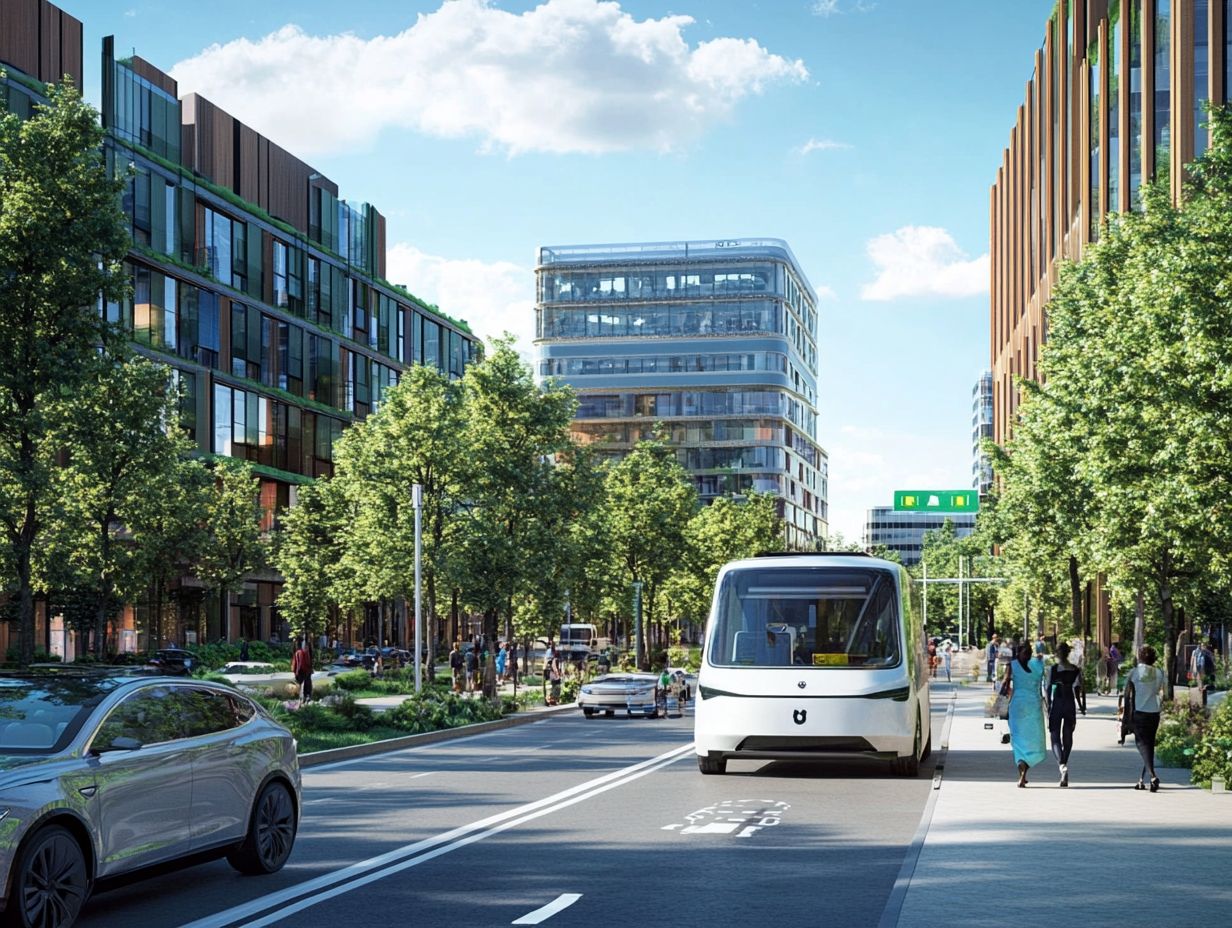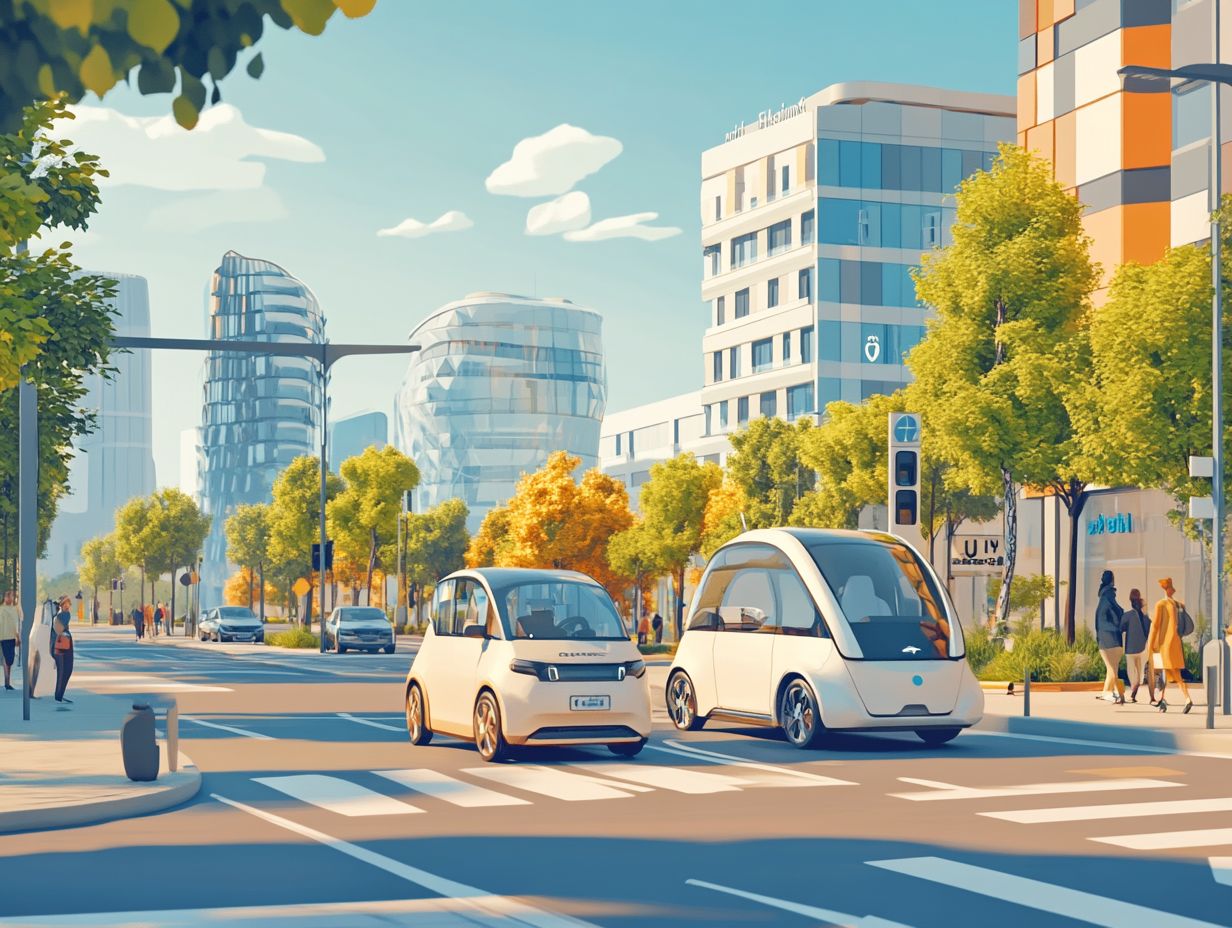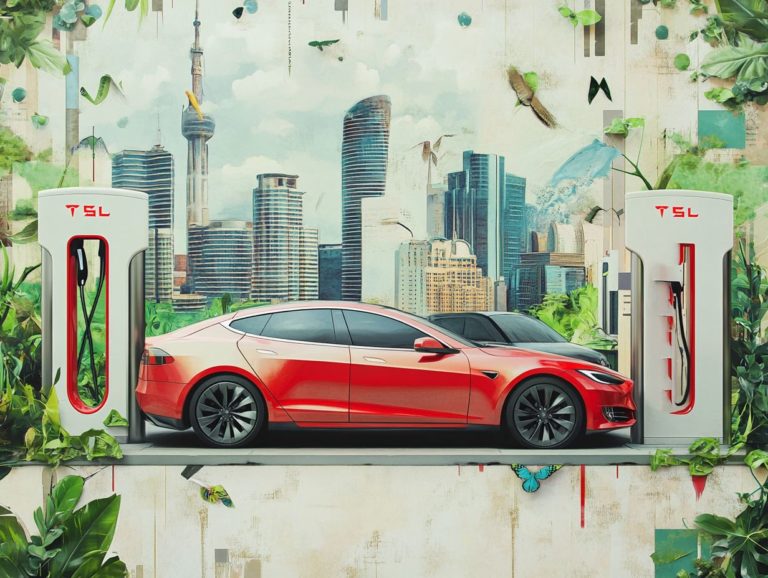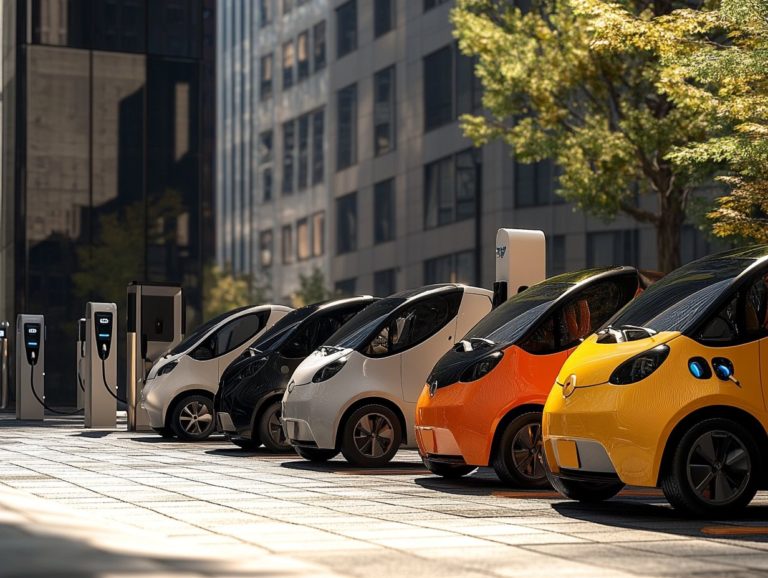92. the impact of electric vehicles on public health
Electric vehicles (EVs) are frequently regarded as an important solution for cleaner transportation, yet their impact reaches far beyond merely cutting carbon emissions.
In this article, you will delve into the intricate relationship between EVs and public health, uncovering substantial benefits such as reduced air and noise pollution as well as potential drawbacks, including concerns surrounding the environmental impact of battery disposal and heightened accident risks.
You ll also discover strategies to mitigate these risks, ensuring that the shift to electric vehicles fosters a healthier future for everyone.
Contents
Key Takeaways:

Electric vehicles have the potential to greatly improve public health by reducing air and noise pollution, as well as improving respiratory health. However, there are also concerns about the negative effects of electric vehicles, such as the environmental impact of battery disposal and increased risk of accidents. To address these issues, we must consider the impact of electric vehicles on climate change, develop safe ways to dispose of batteries to reduce these risks, and implement safety measures for electric vehicles.
What are Electric Vehicles?
Electric vehicles (EVs) represent a transformative leap in the transportation system, crafted to minimize vehicle exhaust emissions and reduce our reliance on oil and gas. This shift not only champions clean electricity but also paves the way for sustainable transportation solutions.
Operating on electricity stored in batteries, EVs come in various models, seamlessly integrating advanced technology to enhance energy efficiency and performance. Embracing electric vehicles allows you and your community to significantly reduce your carbon footprints while enjoying an expanding selection of options, from compact cars to spacious SUVs and even electric buses.
The strides made in battery technology have rendered these vehicles increasingly viable and enticing, boasting longer ranges and faster charging times. Electric vehicles also help reduce noise pollution, fostering quieter, more serene urban environments.
As charging infrastructure continues to grow and more environmentally conscious consumers adopt this alternative, the collective impact on air quality gains momentum. This change creates healthier cities and moves us toward a sustainable future.
Benefits of Electric Vehicles on Public Health
Electric vehicles (EVs) present numerous advantages for public health, primarily by dramatically reducing air pollution a key factor in respiratory and cardiovascular diseases.
Switching to electric vehicles is crucial for decreasing greenhouse gas emissions from the transportation sector, which stands as one of the largest contributors of vehicle exhaust. By enhancing air quality and mitigating health risks linked to tiny particles that can harm your lungs and nitrogen oxides, EVs play a vital role in preventing severe pollution consequences.
This includes the staggering estimate of 200,000 premature deaths each year, ultimately contributing to a healthier population.
Reduced Air Pollution

The adoption of electric vehicles stands as a vital strategy for you to combat air pollution and enhance overall air quality, particularly in urban areas where vehicle exhaust is a pressing concern.
Unlike traditional fossil-fuel-powered cars, electric vehicles produce zero tailpipe emissions, making a direct contribution to lower levels of harmful pollutants like carbon dioxide, particulate matter, and nitrogen oxides. By reducing these air pollutants, you pave the way for better public health outcomes, fewer respiratory diseases, and a less toxic environment.
Studies show that making the switch to electric vehicles could slash greenhouse gas emissions by up to 70% over their lifetime compared to internal combustion engine vehicles. For example, a report from the American Lung Association revealed that if every light-duty vehicle in the U.S. were electric, it could lead to a staggering 16 million fewer tons of CO2 emissions each year.
Many of today s electric vehicles utilize eco-friendly manufacturing processes and are frequently powered by renewable energy sources, which only amplifies their environmental benefits.
As cities grapple with increasing air quality challenges, transitioning to electric vehicles is not just a choice it s an essential step toward a cleaner and healthier future for urban populations. Join the movement towards cleaner transportation today!
Improved Respiratory Health
Improved respiratory health is one of the most compelling benefits of embracing electric vehicles, especially in urban areas struggling with air pollution from traditional cars.
Research shows that reducing exposure to tiny particles in the air that can harm health and chemicals that can evaporate into the air emitted by conventional vehicles can significantly lower the incidence of asthma and other respiratory conditions.
Cities can create cleaner air environments that foster healthier communities by championing electric vehicle policies and enhancing charging infrastructure.
Studies reveal that cities enforcing strict emissions regulations and offering incentives for electric vehicle adoption witness remarkable reductions in hospitalizations due to respiratory issues.
For example, a recent study highlighted that urban areas with a substantial influx of electric vehicles saw a 20% decrease in emergency room visits for asthma attacks. This shows a clear and exciting link between clean transportation initiatives and improved public health outcomes.
As municipalities focus on integrating electric vehicles, they advance environmental sustainability and safeguard the well-being of their residents, paving the way for healthier populations and vibrant cityscapes.
Decreased Noise Pollution
One often-overlooked benefit of electric vehicles is their remarkable ability to reduce noise pollution in urban areas, leading to a more peaceful living environment. Unlike traditional gasoline-powered cars, electric vehicles operate quietly, significantly lowering overall noise levels in crowded spaces.
This not only fosters better public health but also enhances your quality of life. Imagine a city where the noise of honking horns and revving engines is replaced by a serene ambiance. Such a reduction in noise pollution can help alleviate stress and promote mental well-being among residents.
Recent studies highlight a concerning link between noise pollution and various health issues, including cardiovascular diseases and sleep disturbances. The World Health Organization estimates that excessive road traffic noise costs Europe at least one million healthy life years each year.
By minimizing ambient noise, electric vehicles can play a crucial role in mitigating these health risks. Research also reveals that neighborhoods with lower noise levels enjoy higher rates of physical activity and improved social interactions, showcasing how electric vehicles help foster healthier, more connected communities.
Potential Negative Effects on Public Health

While electric vehicles offer many advantages for public health, it’s important to be aware of potential challenges that come with their widespread adoption.
The disposal of batteries, which can contain harmful materials, presents a significant challenge for both environmental and public health. This highlights the need for effective electric vehicle policies focused on sustainable management.
Moreover, as electric vehicles become more common on the roads, new health risks may emerge, such as accidents involving these quieter vehicles, which can be less audible to pedestrians and cyclists.
In conclusion, while the benefits of electric vehicles are substantial, addressing potential challenges proactively will ensure a healthier future for all.
Take action today! Advocate for electric vehicle adoption and engage in community discussions about sustainable transportation choices.
Disposal of Batteries
The disposal of batteries from electric vehicles poses a significant public health concern that you should take seriously. Improper handling can lead to environmental contamination and health risks.
These batteries often contain heavy metals and toxic chemicals that demand careful management to prevent pollution and protect communities. As the electric vehicle market grows, support sustainable battery disposal methods. Advocate for renewable energy in battery production to protect health and the environment.
Recent studies show that around 2.5 million tons of spent batteries find their way into landfills each year, leading to possible harmful leakage into soil and groundwater.
There have been documented cases where pollutants from battery waste have impacted local water supply systems, resulting in serious health issues among residents, including respiratory and neurological disorders. According to the Environmental Protection Agency, communities near improperly disposed battery sites experience a 20% higher incidence of health-related problems.
By advocating for proper recycling protocols and raising public awareness about battery disposal, you can help mitigate these risks. Together, we can ensure a healthier environment for future generations.
Electric Vehicles: A Quiet Risk on the Roads
The shift to electric vehicles, while undeniably advantageous, brings certain concerns, particularly regarding the heightened risk of accidents on the roads. Many electric vehicles operate at significantly reduced noise levels, which can pose hazards for pedestrians, cyclists, and other road users who depend on auditory cues for safety.
We must tackle this issue head-on through awareness campaigns and improved electric vehicle policies to mitigate risks and safeguard public health and safety in the ever-evolving transportation landscape.
With electric vehicles nearly silent, especially at lower speeds, the potential for unintentional collisions becomes a pressing concern. This alteration in sound dynamics can especially endanger individuals with visual impairments or distractions, making them less aware of approaching vehicles.
To address this concerning trend, it s essential to implement strategies that encompass educational outreach, informing the public about the unique characteristics of electric vehicles. Policymakers might consider mandating sound emission regulations for electric vehicles during low-speed operation, ensuring that all road users receive adequate warnings of their presence.
Addressing Concerns and Mitigating Risks

To truly harness the advantages of electric vehicles while mitigating any potential drawbacks to public health, you must implement strong strategies now. This means developing sustainable battery disposal methods that safeguard both the environment and public health, alongside instituting safety measures for electric vehicles to lessen accident risks on the road.
By enhancing electric vehicle policies, you can significantly influence these initiatives and facilitate a smooth transition to greener transportation options.
Developing Sustainable Battery Disposal Methods
Developing sustainable battery disposal methods is essential for ensuring that the environmental benefits of electric vehicles remain untarnished by the risks of battery waste. By adopting effective recycling and disposal practices, you can help mitigate environmental contamination while championing the use of renewable energy in battery production.
Establishing comprehensive programs focused on safe disposal can significantly enhance public health outcomes and support the broader goals of electric vehicle adoption.
One innovative approach involves advanced hydrometallurgical techniques, methods used to recover metals from batteries, which efficiently recover valuable metals while reducing harmful waste. For instance, initiatives in countries like Sweden employ cutting-edge processes to recycle lithium-ion batteries, drastically reducing landfill waste and lessening the reliance on mining for raw materials.
Collaborations between automotive manufacturers and recycling firms have paved the way for closed-loop systems, where recovered materials are reintegrated into new battery production. These best practices not only contribute to environmental sustainability but also safeguard community health by addressing the risks associated with toxic battery disposal.
We must act now to protect future generations and the environment through sustainable practices.
Implementing Safety Measures for Electric Vehicles
As electric vehicles become more popular, ensuring their safety is critical to protecting our communities. Implementing robust safety measures is essential as their presence surges in the transportation sector. You can consider strategies such as sound-emitting devices devices that make sounds to alert people nearby comprehensive driver education programs, and regulations that promote safe driving practices.
By proactively addressing safety concerns, we can help ensure a smoother transition to electric vehicles while maximizing their health benefits.
In various regions, local governments are adopting distinctive policies to strengthen safety measures. For instance, some cities in Europe are mandating pedestrian alerts in electric vehicle designs, effectively reducing accidents in bustling urban areas.
Countries like Japan prioritize electric vehicle training programs that inform drivers about the unique characteristics of these vehicles, ensuring they grasp the nuances of safe operation.
In North America, programs are looking for ways to encourage manufacturers to incorporate advanced safety technologies. This reflects a commitment not only to enhance vehicular safety but also to potentially diminish health risks associated with traffic incidents.
Watch this informative video on the benefits of electric vehicles.
Frequently Asked Questions
What is the impact of electric vehicles on public health?
The impact of electric vehicles on public health is significant as they help reduce air pollution, which can lead to respiratory and cardiovascular health issues. For a deeper understanding of the environmental impact of electric vehicles, they also help decrease noise pollution, which can improve mental well-being.
How do electric vehicles reduce air pollution?
Electric vehicles produce zero emissions at the tailpipe, meaning they do not release harmful pollutants into the air like traditional gasoline or diesel vehicles. As a result, they help improve air quality and decrease the risk of respiratory and cardiovascular diseases.
In what ways do electric vehicles benefit public health?
Electric vehicles offer exciting benefits that can transform public health! They reduce air and noise pollution, which can improve respiratory and cardiovascular health, as well as mental well-being. They also help decrease reliance on fossil fuels, which contribute to climate change and can have adverse effects on public health.
Are there any downsides to the increasing use of electric vehicles?
While electric vehicles have many benefits for public health, there are also a few downsides to consider. One major concern is the environmental impact of producing the batteries used in electric vehicles. The infrastructure for charging electric vehicles also needs improvement in many areas.
Can electric vehicles help reduce healthcare costs?
Yes, electric vehicles have the potential to reduce healthcare costs in the long run. By decreasing air pollution and improving overall public health, we may see a reduction in healthcare expenses related to treating respiratory and cardiovascular diseases. As the demand for fossil fuels decreases, there may also be a decline in healthcare costs associated with treating illnesses caused by exposure to pollutants from fossil fuel production and use.
What can individuals do to encourage the use of electric vehicles for public health benefits?
You can make a difference by choosing to purchase and drive an electric vehicle yourself. Advocate for more charging stations in your community today! Support policies that incentivize the production and use of electric vehicles. Additionally, reducing overall car usage and opting for alternative modes of transportation, such as walking, biking, or public transit, can also have positive impacts on public health and the environment.





